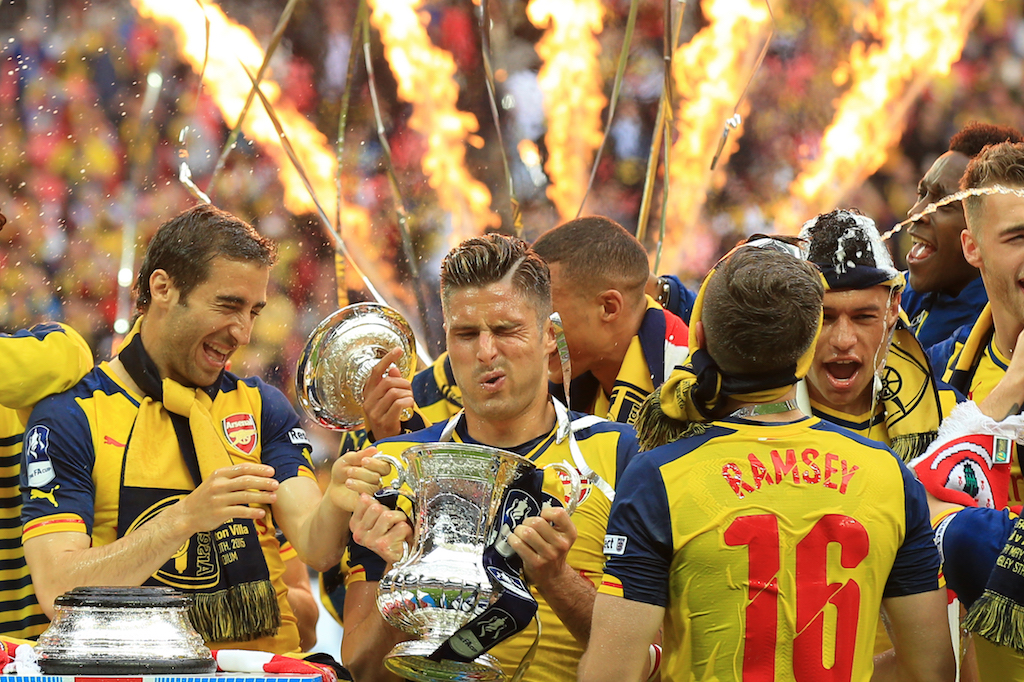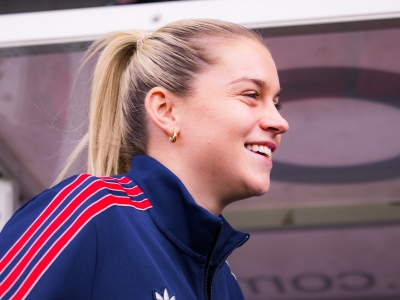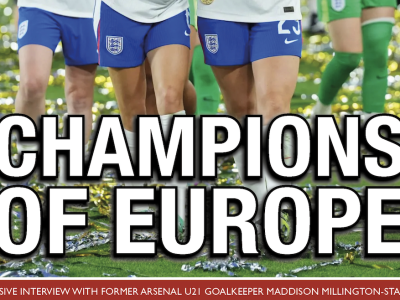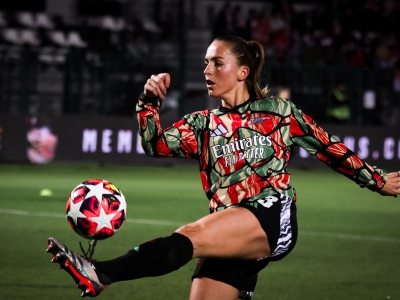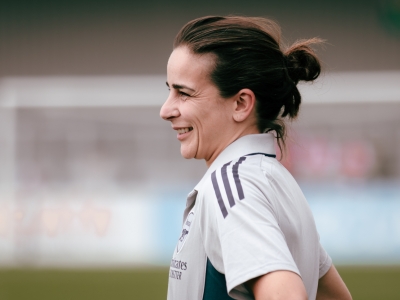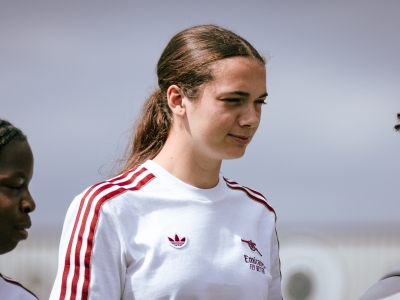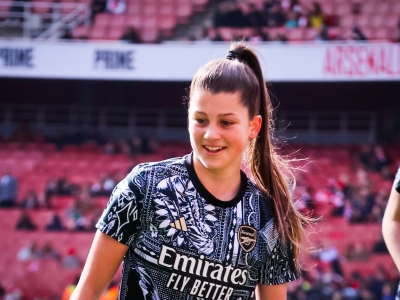As Arsenal prepares once again for a trip to Wembley and an FA Cup Final, thoughts turn to just how often cup finals have marked the beginning, or the end, of an era in Arsenal’s history.
George Graham’s young guns once gloriously announced themselves at Wembley in 1987 with an historic and vibrant victory over Liverpool.
Even in defeat, Wembley can be a prelude to glory and greatness. Bertie Mee’s Arsenal drew upon the collective bitterness of consecutive League Cup Final defeats in 1968 and 1969 to forge the togetherness and the sheer bloody mindedness which so eloquently defined the Arsenal vintage of 1970 and 1971.
Our history is punctuated with many such moments but it is upon one that I especially want to linger.
There is a photo on my wall above where I sit now, of a smiling Joe Mercer holding aloft the FA Cup, a moment frozen in time from 70 years ago which captures the glorious culmination of a period of greatness which had made the Gunners famous all over the world.
The Arsenal would still go on to scramble the league title three years later in 1953, on the slimmest of margins, a goal average 0.099 better than second placed Preston North End, after having lost at Preston on the penultimate Saturday of the season, but 1950 feels like the end of a journey of pomp and circumstance: the one off, sudden death nature of a cup final somehow capturing in sharper and more dramatic relief the warrior essences of Mercer, the Comptons, Lewis, and Logie; that happy band of brothers under the stewardship of Tom Whittaker.
Pause for a minute to take in the echoes of sounds that drift across the intervening years of ghostly footsteps along Wembley Way, the sound of rattles, and the cries of hawkers flourishing our colours and ‘Arsenal for the Cup’ rosettes, all to a constant medley of ‘play up Arsenal!’ Gaze for a moment upon a sepia tinted piece of Arsenal history and know beyond doubt that come what may we all belong to a community that is more than the mere transient distraction of victory or defeat: for this is Arsenal!
In late April 1950, as constant rain-washed London for a week the talk of the press was that it was a cup final too close to call. The old chestnut of ‘lucky Arsenal’ got a good airing too, the northern papers making constant reference to the fact that Arsenal’s cup campaign had in terms of distance travelled amounted to a mere handful of miles: White Hart Lane for the semi-final and Wembley for the final being the furthest the Gunners had had to travel.
Indeed, the heavy rain had been a constant problem for Wembley’s head groundsman, Percy Young, as he battled to prepare a pitch worthy of football’s showpiece occasion.
Speaking on the Friday, Young sheepishly admitted that the surface might be ‘yielding’. Preparations for the game behind the scenes at Wembley were all go. 30,000 extra temporary seats were installed, 12,000 bottles of beer were stocked along with 40,000 tubs of ice cream and provision for 30,000 cups of tea!
The FA also admitted to having received eight spurious claims from police officers for tickets to the game, all claiming to have been the officer mounted on the famous police horse Lady Godiva, the iconic white horse from the 1923 final!
Interesting to note too that the number of liveried commissionaires on duty at the game to salute, assist and direct was double the amount of police officers!
Arsenal’s opponents that day, Liverpool, were first to announce their line-up, the only surprise was the omission of future Anfield boss, Bob Paisley, this despite Paisley having played and scored in their semi-final success against rivals Everton.
When Whittaker released Arsenal’s XI, there were no surprises; it was the same team who had gone down disappointingly 3-0 away at Wolves in the last game before Wembley.
It was also the same team who had begun the semi-final against Chelsea, a 2-2 draw salvaged courtesy of a Compton double act in the last few minutes: Les heading home a corner from Denis.
The one serious selection issue had been between two Scottish internationals: whether to stick with Forbes or go with Archie Macaulay at right-half, but Whittaker was a fan of continuity and Forbes kept his place.
Up front the Arsenal line was to be led by a youngster: the talented Peter Goring who had yet to find the net though in the 1950 cup campaign. The press had described Goring’s qualities thus: ‘ceaseless probing, brilliant anticipation, speed and positional play’.
Goring had joined Arsenal from Cheltenham Town on the advice of Cheltenham boss and ex-Gunner Jimmy Brain. Indeed, Brain would be at Wembley to cheer his protégé on along with no less than nine members of Goring’s family.
Brain had played in two cup finals with Arsenal and attended a Friday dinner for Arsenal cup final players of yesteryear.
While that night of misty-eyed reminiscences was taking place, across London the Press Club were holding their own annual jamboree and would at its conclusion name Arsenal captain, Joe Mercer as the football writers’ Footballer of the Year. Mercer’s preparations for the final have become the stuff of football folklore.
After inheriting his father-in-law’s grocery business on Merseyside, Mercer had run it himself, still living as he did on the Birkenhead side of the river. Unable to be in London, Mercer trained with cup final opponents Liverpool in the week leading up to the game, this after having played for Everton before transferring to Highbury too.
So well thought of was gentleman Joe that he was welcomed with open arms, and he never forgot Liverpool’s generosity of spirit either.
No one expected a free flowing, open game, indeed the view was that should Arsenal get a goal up then Liverpool might have ‘had it’ for defence was Arsenal’s strong hand.
The game has come to be known as the Compton Final, something thought to reference Denis, but given the brilliance of Arsenal’s defensive play it might more readily refer to his brother, centre half Leslie.
Mercer bossed the area and space in front of the defence, winning the game’s key battle with Liverpool’s outside-right Payne; for 90 minutes the Arsenal skipper simply went about his business breaking up Liverpool attacks and starting Arsenal off with short balls out of defence, frequently to Denis Compton who kept dropping deep on Arsenal’s left wing.
Indeed Compton was the orchestrator of the one swift progressive movement of the game, in the first half, a seven or eight man move from one end of the pitch to the other, which comes as close to resembling the modern game as you can in big baggy cotton tops and oversized knee length shorts.
Once the Arsenal had emerged from the north dressing room, into the drizzle falling from a lowering sky, in pristine yellow shirts; and had shaken hands with the King, they took an unremitting iron grip upon the game, which the Sunday morning headlines bore able testament to: ‘No Way Through Arsenal’s Cast-Iron Defence’, and ‘Stalwart Gunners’ Defence Stands Firm’.
Two goals from Reg Lewis, one in either half, might seem to be the winning contribution, but writing in The People, ex-Arsenal winger, Joe Hulme, who knew a thing or two about winning cups with the Gunners, thought neither the defence nor Lewis deserved the accolades: for him it was simple: it was the butcher’s boy from Gloucestershire, the young, lanky Peter Goring who was the man of the match. Hulme wrote:
‘The fountain head of Arsenal’s success…Goring gave one of the finest centre-forward displays I have ever seen…he was the terrier, the worrier, the unsettler...the inspiration…here one minute there the next, chasing wherever the ball was…keeping [things] moving with rhythm and style…and there lay the clue to the result.’
Other heroes of the hour were likewise mentioned in dispatches: ‘Leslie Compton, playing the game of his life, going in for the ball with all the verve of a youngster...shut [Liverpool] out of the match like a slammed door’;
And this: ‘Footballer of the Year, Joe Mercer, played as he always does with a cool, unhurried touch of class and clarity of thought which places him amongst the giants’;
And finally: ‘In goal there was another grand veteran, the daddy of the lot in age, George Swindin wearing a blood red jersey…yesterday he was a great goalkeeper’.
There was a proud spirit about the boys from Highbury, a collective sense of purpose melded to an aura that preceded the club where ever it went. A last word must go to Hulme.
‘When I saw the rain falling…I feared the ‘old men in gold’ would not be able to stand the extra strain of a heavy pitch and leaden ball, but they came through wonderfully…they were the complete football team.’
The complete football team…the complete club – the Arsenal! Play up Gunners, play up!

